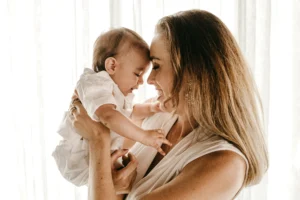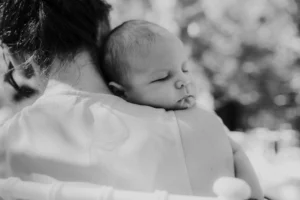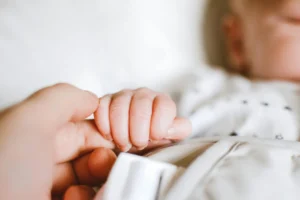At Rocky Mountain Sleeping Baby, we know parents are always looking for ways to better understand and support healthy pediatric sleep. One of the fastest-growing trends in 2025 is the use of wearable baby sleep trackers like smart socks, bands, and monitors that claim to track everything from oxygen levels to sleep cycles. These devices promise valuable insights, but the real question is: do they actually help with baby sleep, or do they add unnecessary stress for parents?
Parents are turning to sleep trackers for several reasons. For some, it’s the reassurance of seeing real-time updates about their baby’s sleep and breathing. Others like the idea of having data-driven insights to help them recognize patterns and adjust routines. And with the rapid growth of the baby tech market, it’s no surprise that more families are experimenting with these gadgets as part of their nightly routine.
But what do the experts say? The American Academy of Pediatrics (AAP) currently does not recommend routine use of wearables for healthy infants. One of the main concerns is that these devices can trigger false alarms, which can create more anxiety instead of reducing it. They are not medical devices and should never be seen as replacements for safe sleep practices, like putting babies on their backs to sleep, using a firm mattress, and keeping the crib free of loose items. Some pediatric sleep experts do note that sleep trackers can offer helpful trend insights, especially for older infants or toddlers, but they caution against relying too heavily on them.
There are both advantages and drawbacks to consider. On the plus side, wearable trackers may help parents notice sleep patterns they hadn’t recognized before, encourage more consistent bedtime routines, and offer a sense of reassurance. On the downside, the accuracy of these devices can be limited, sometimes giving parents false confidence or unnecessary worry. They also come at a cost, and there’s no guarantee they will lead to better sleep for your child.
At Rocky Mountain Sleeping Baby, we believe wearable sleep trackers should be seen as optional tools, not essential ones. For many families, these gadgets can cause more stress than they solve. True, lasting improvements in baby sleep come from consistent routines, a supportive environment, and an understanding of your child’s developmental needs, not from technology alone.
In the end, wearable baby sleep trackers are an interesting and very current topic in pediatric sleep, but they are not a magic solution. They may provide peace of mind for some families and useful data for others, but they should never replace safe sleep practices or the foundations of healthy sleep habits. If you decide to try one, think of it as a guide rather than a guarantee. At Rocky Mountain Sleeping Baby, we’re here to help you build those healthy foundations that last, whether or not you use the latest gadget.





